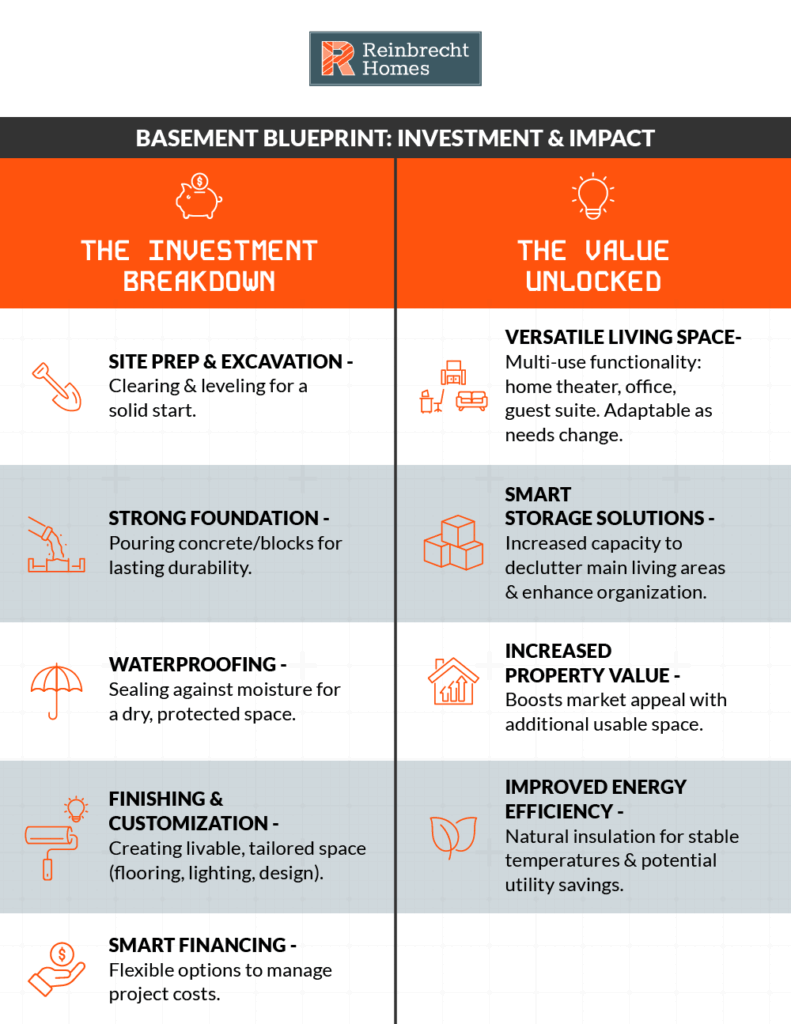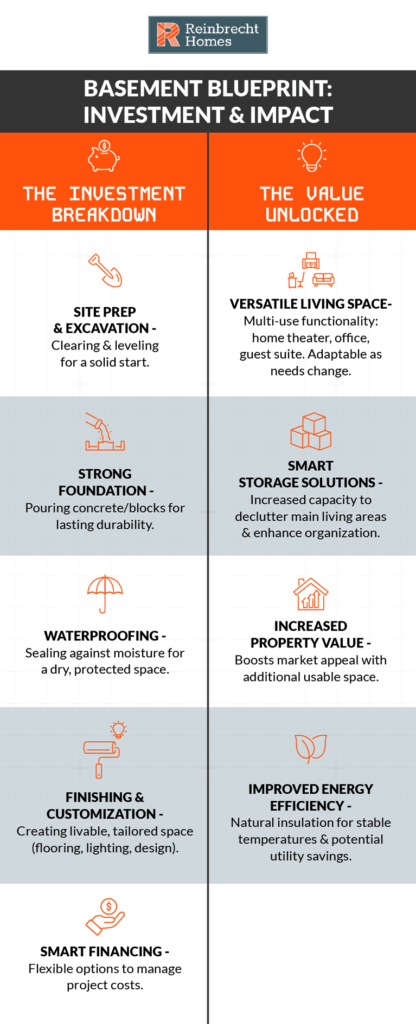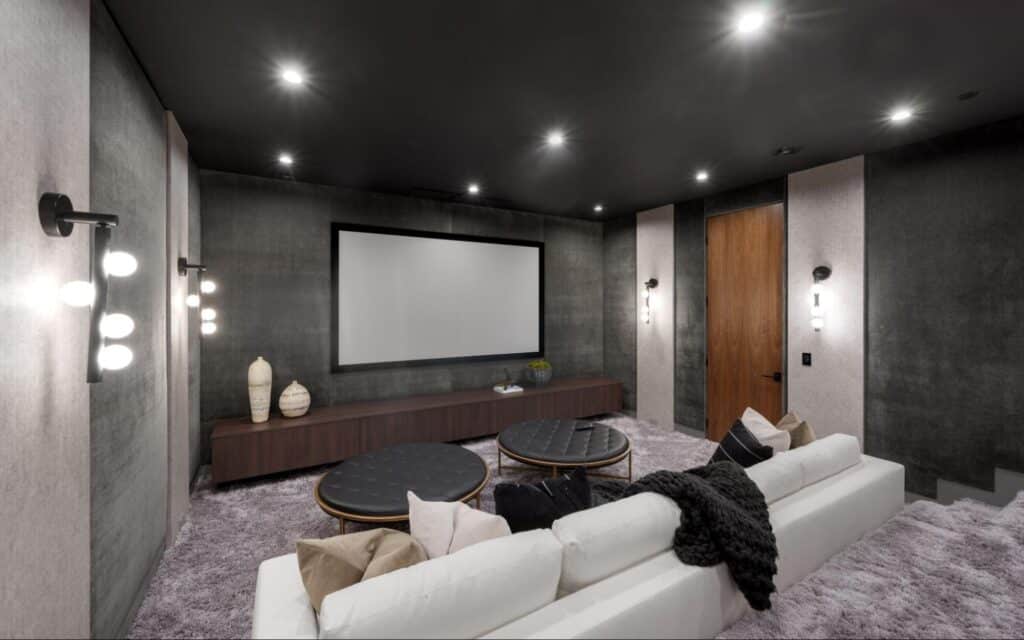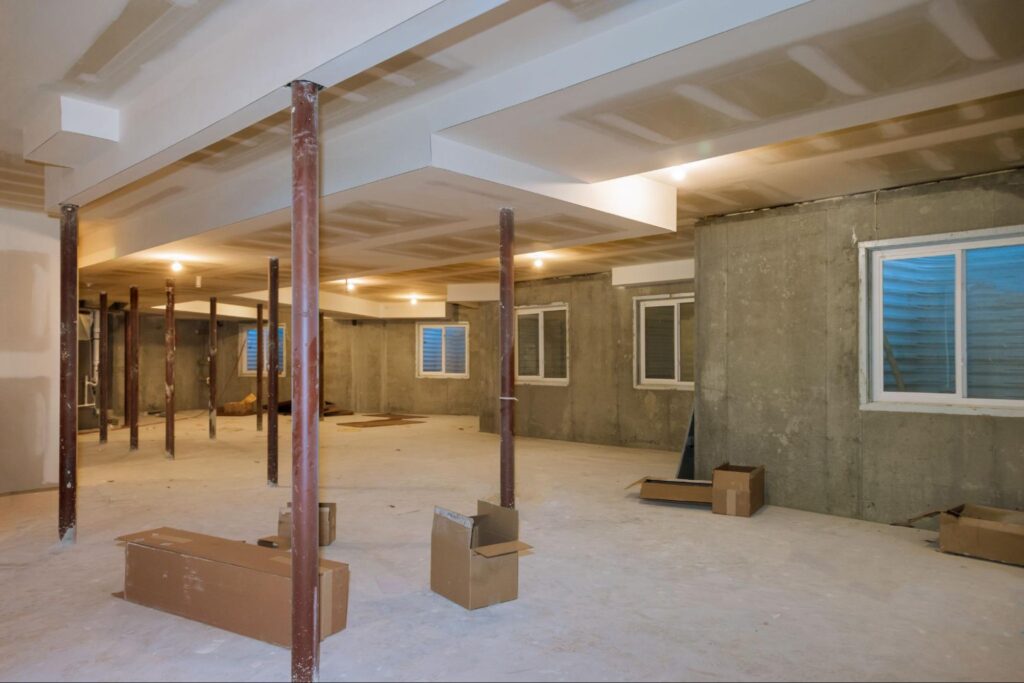Building a basement is an important decision for homeowners. A basement not only offers additional flexible space that can be customized for a home office, family entertainment, or extra storage, but it can also enhance your property’s energy efficiency and long-term value. It is important to note that while a well-finished basement can be highly functional, below-grade areas are often valued differently from traditional above-grade square footage in official assessments.
To help you make an informed decision, we’ve put together an overview of basement construction and the factors that can influence the cost and value of a basement addition to your home. We also share insights on how your home can benefit from a basement and how to navigate local regulations when planning a basement project.
Understanding the Costs of Building a Basement
Investing in a basement involves several cost components. Although the initial investment may appear significant, a well-designed basement can add lasting value. Below is an overview of the main cost elements:
1. Site Preparation and Excavation
Preparing your lot involves:
- Clearing the area and site preparation to the required depth.
- Handling challenges such as rocky ground or sloped terrain, which might require specialized equipment and proper excavation techniques.
Think of this process as preparing a solid foundation for any garden—the right start is essential.
2. Building a Strong Foundation
Creating a durable foundation typically involves:
- Pouring concrete or laying blocks to establish a solid base.
- Using high-quality materials to ensure durability and to protect against moisture.
A strong foundation is as vital as the sturdy base of a treasured piece of furniture.
3. Waterproofing: Keeping Your Basement Dry
Waterproofing is crucial to prevent moisture problems. This step involves:
- Installing protective membranes, sealants, and drainage systems.
- Using effective protective membranes that act like a “raincoat” for your basement, protecting it from leaks and dampness.
A proper waterproofing system can help avoid future repairs and safeguard your investment.
4. Finishing and Customization
Converting an unfinished basement into a livable space includes:
- Installing flooring, insulation, lighting, and other key features.
- Customizing the design to suit your needs, whether for a family room, an office, or a multi-use area using customizable floor plans.
A finished basement improves home functionality by creating additional versatile living space. However, its contribution to official square footage may be assessed differently by appraisers depending on factors such as the market and finish quality.
5. Financing Your Investment
Basement projects usually involve a larger initial investment compared to simpler home additions. Reinbrecht Homes offers flexible financing options that may include free construction loans (subject to availability and specific terms), allowing you to integrate basement expenses into your overall home project while maintaining cash flow throughout construction.
Transitioning from cost details to benefits, let’s explore how these investments can enhance your home.
Unlocking the Benefits of a Basement in Your Custom Home
A basement can serve as a multifunctional asset that elevates your home in several ways:
Expanded and Versatile Living Space
- Multi-Use Functionality: Convert your basement into a home theater, guest suite, or a dedicated workspace.
- Adaptability: Begin with a basic area and develop it further as your needs change to create a truly adaptable space.
This flexibility offers your household the ability to grow and change without major renovations to the primary living area.
Organized and Efficient Storage
- Increased Storage Capacity: Relocate seasonal items, tools, and belongings to reduce clutter in your main living areas.
- Enhanced Organization: Built-in shelving and closets can help maintain a tidy home.
Practical storage solutions contribute to a more organized lifestyle and enhance the day-to-day functionality of your property.
Increased Property Value
- Market Appeal: A finished basement can make a home more attractive by adding additional usable space.
- Valuation Considerations: While extra living space is appealing, appraisers may assess below-grade spaces at a different rate than above-grade areas, so the impact on resale value depends heavily on market conditions and design quality.
Improved Energy Efficiency
- Natural Insulation: Basements, being partially underground, often benefit from stable temperatures—cooler in summer and warmer in winter.
- Utility Savings: Efficient insulation and sealing help reduce energy costs associated with heating and cooling. A well-designed basement can function much like an extra layer of insulation, contributing to overall energy efficiency over time.


Navigating the Challenges of Basement Construction
Though the benefits are significant, certain challenges require attention for a successful project:
Higher Initial Investment
- Upfront Costs: Extensive excavation, reinforced foundation walls, and superior waterproofing add to the initial investment.
- Long-Term Benefits: These expenses help create a functional, long-lasting space that adds value well into the future.
Moisture and Water Management
- Environmental Factors: The humid climate and heavy rains common to the midwest necessitate proactive moisture control.
- Preventive Solutions: Investing in robust waterproofing and proper drainage systems is critical to minimize potential issues.
Ongoing Maintenance
- Regular Upkeep: Routine inspections—especially of waterproofing and drainage—are needed to ensure long-term integrity.
- Preservation: Timely maintenance helps sustain the basement’s quality and value.
Site and Property Specifics
- Variable Conditions: Soil type, moisture levels, and terrain vary and can affect construction techniques.
- Professional Assessment: A detailed site evaluation ensures that your basement construction meets local challenges effectively.
Carefully considering these factors helps balance initial investments with long-term rewards.
Key Considerations Before Committing to a Basement
Before proceeding, consider these essential points:
- Property Evaluation: Confirm that your lot’s soil and topography are suitable.
- Initial Investment: Plan your budget and financing, including any contingency expenses.
- Maintenance Costs: Plan for both initial construction and ongoing maintenance.
- Energy Efficiency: Focus on design elements that support energy conservation.
- Lifestyle Needs: Ensure the additional area suits both your current and anticipated family needs.
- Professional Guidance: Work with experienced professionals like Reinbrecht Homes, who offer customizable floor plans and financing options tailored to your project.
These considerations help ensure a well-informed decision that aligns cost, lifestyle, and long-term home value.
How Reinbrecht Homes Delivers Expert Basement Construction
Partner with Reinbrecht Homes to bring your basement vision to life. Here’s what sets us apart:
Customizable, Tailored Designs
- We offer a variety of floor plans that can be adapted to match your needs.
- Every detail—from layout to finishes—is planned to maximize both functionality and visual appeal.
Transparent Project Management
- Receive regular updates throughout the construction process.
- Clear communication helps ensure that timelines and budgets stay on track.
Energy-Efficient, Sustainable Practices
- Our designs emphasize proper insulation, efficient HVAC systems, and effective ventilation.
- These practices help ensure the basement is both comfortable and cost-effective over time.
Flexible Financing Options
- Various financing methods are available, including potential avenues for free construction loans (subject to eligibility and terms), to smoothly integrate basement projects into your overall home build.
- This approach helps ease the financial burden while keeping your project on pace.
Commitment to Quality and Durability
- From excavation to final finishes, every construction detail is handled with precision.
- Our quality standards are designed to reduce future maintenance and preserve your home’s long-term value.
Innovative Basement Design Trends for the Modern Home
Basements have evolved beyond the traditional “man cave” concept to become an essential part of the modern home. These design trends can enhance your basement’s value and appeal:
Multipurpose Spaces
Maximize your basement’s potential by creating a versatile, multipurpose space that can adapt to your household’s changing needs. With clever storage solutions and modular furnishings, you can set up an office, a home theater, and even a kid-friendly play area in the same space.
Natural Light and Brightness
Incorporating natural light into your basement design can make the space feel more inviting and less claustrophobic. This can be achieved through egress windows, skylights, or glass doors that allow light to flow in from other areas of the home.
Open Concept Design
Increasingly, homeowners are leaning toward open concept layouts that create a seamless flow between the basement and other areas of the home. This design trend also contributes to efficient space use and can make smaller basements feel more expansive.
High-End Finishes and Features
Basement finishing options have come a long way. With high-quality flooring, wall finishes, and modern lighting, you can create a space that feels like an extension of your primary living area. Other popular features include built-in fireplaces, wet bars, and custom cabinetry.
Practical Storage Solutions
Innovative storage solutions, such as built-in shelving, can help keep your basement organized and clutter-free, making it more functional while adding to your home’s appeal.
Maintenance and Future-Proofing Your Basement for Long-Term Success
To maximize your basement’s long-term value, ongoing maintenance and periodic upgrades are essential.
Regular Inspections and Upgrades
Schedule annual inspections with a trusted professional to check for signs of moisture, foundation cracks, or issues with waterproofing. Periodic updates, such as replacing older insulation or modernizing HVAC systems, can help maintain energy efficiency and functionality.
Incorporating Flexible Design Elements
Plan your basement with adaptable features like modular wall systems or flexible storage solutions. These elements make it easier to convert the space—whether into a home theater, extra living area, or rental unit—as your needs evolve.
Future-Proofing with Smart Technology
Integrating smart home technology can enhance security and efficiency. Systems that monitor moisture levels, control climate remotely, or alert you to structural issues add convenience and help safeguard your investment.
Energy and Cost-Saving Practices
Upgrading insulation and employing energy-efficient windows and doors contributes to lower utility bills. Regular evaluations of energy usage before and after such upgrades can highlight the benefits of maintaining a well-insulated basement.
By planning ahead with regular maintenance, flexible design, and smart technology, your basement can remain a valuable asset for years to come.
Additional Insights on Basement Costs and Resale Value
Basement construction costs vary depending on several factors, such as location, size, and design. However, according to HomeAdvisor, the average cost of a basement project in the United States ranges from $30,000 to $70,000, with high-end projects costing up to $200,000. Reinbrecht Homes has experience working with homeowners on basement projects of all sizes and price points, and we can provide guidance on budgeting and cost-saving options.
When considering resale value, keep in mind that appraisers may assess below-grade areas at a lower rate compared to above-grade spaces. The resale value of a basement project depends on various factors, including the local real estate market, the quality of materials and finishes, and the overall design and functionality of the space. Work with a trusted builder like Reinbrecht Homes to ensure your basement project maximizes your home’s value and appeal, whether for your family’s enjoyment or resale potential.
Navigating Local Regulations and Building Codes
Before embarking on a basement project, consider the local regulations and building codes that may apply to your area. For instance, in Indiana, any basement or below-grade space must have egress windows that meet specific size and placement requirements, and contractors must obtain proper permits before construction begins. Partnering with a reputable builder like Reinbrecht Homes can help ensure that your basement project meets all legal requirements and is completed to the highest standards. Additionally, our team has experience navigating local regulations and can provide guidance on the necessary permits and inspections needed for your project.
Take the Next Step Toward a Home Transformation

Adding a basement to your home offers more than extra space—it can enhance your home’s functionality, improve energy efficiency, and potentially increase property appeal. While the initial investment and ongoing maintenance require careful planning, a thoughtfully executed basement project can provide considerable long-term benefits, keeping in mind that below-grade areas may be appraised differently.
By partnering with a trusted custom home builder—like Reinbrecht Homes—you receive comprehensive guidance from property evaluation and design to financing. Experience the expertise, quality, and dedicated planning you need to make a confident decision.
Contact our custom home specialists at Reinbrecht Homes today to schedule a consultation and begin planning a basement that not only enhances your living space but also adapts to your lifestyle and financial goals.

